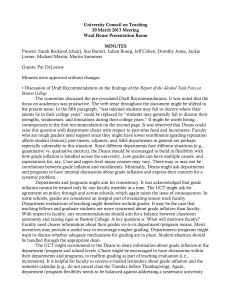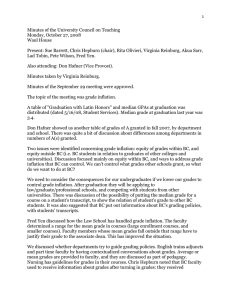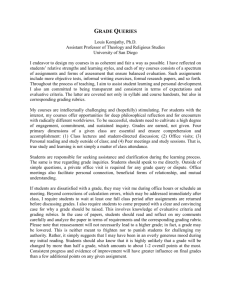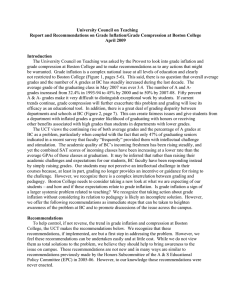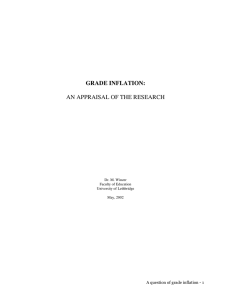April 19
advertisement
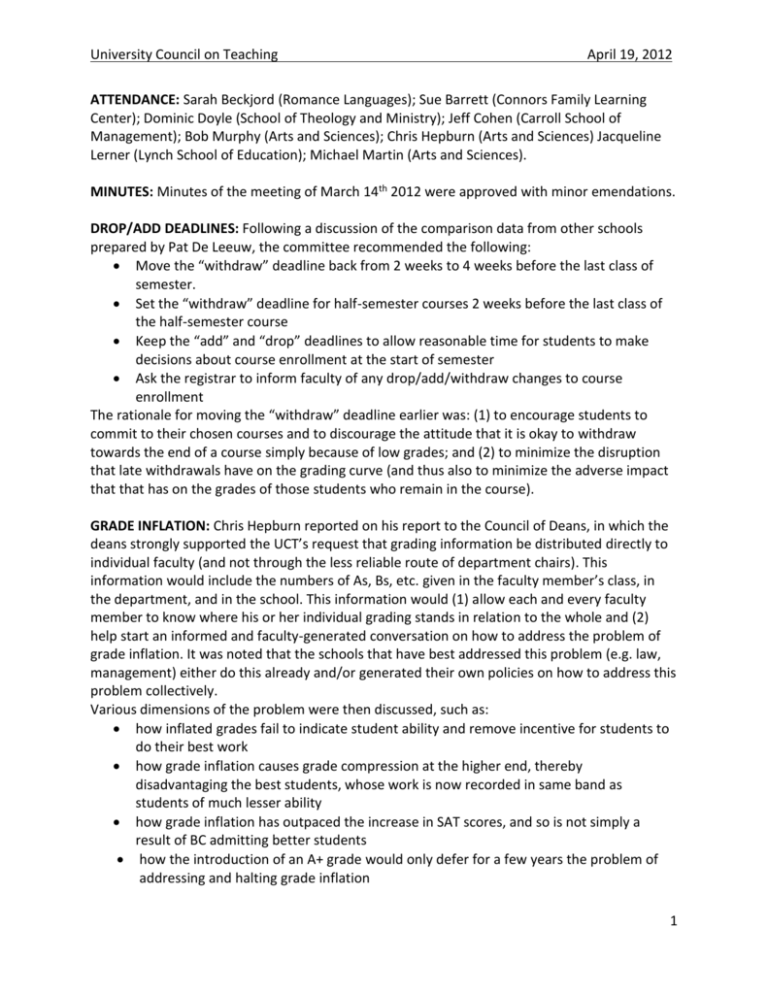
University Council on Teaching April 19, 2012 ATTENDANCE: Sarah Beckjord (Romance Languages); Sue Barrett (Connors Family Learning Center); Dominic Doyle (School of Theology and Ministry); Jeff Cohen (Carroll School of Management); Bob Murphy (Arts and Sciences); Chris Hepburn (Arts and Sciences) Jacqueline Lerner (Lynch School of Education); Michael Martin (Arts and Sciences). MINUTES: Minutes of the meeting of March 14th 2012 were approved with minor emendations. DROP/ADD DEADLINES: Following a discussion of the comparison data from other schools prepared by Pat De Leeuw, the committee recommended the following: Move the “withdraw” deadline back from 2 weeks to 4 weeks before the last class of semester. Set the “withdraw” deadline for half-semester courses 2 weeks before the last class of the half-semester course Keep the “add” and “drop” deadlines to allow reasonable time for students to make decisions about course enrollment at the start of semester Ask the registrar to inform faculty of any drop/add/withdraw changes to course enrollment The rationale for moving the “withdraw” deadline earlier was: (1) to encourage students to commit to their chosen courses and to discourage the attitude that it is okay to withdraw towards the end of a course simply because of low grades; and (2) to minimize the disruption that late withdrawals have on the grading curve (and thus also to minimize the adverse impact that that has on the grades of those students who remain in the course). GRADE INFLATION: Chris Hepburn reported on his report to the Council of Deans, in which the deans strongly supported the UCT’s request that grading information be distributed directly to individual faculty (and not through the less reliable route of department chairs). This information would include the numbers of As, Bs, etc. given in the faculty member’s class, in the department, and in the school. This information would (1) allow each and every faculty member to know where his or her individual grading stands in relation to the whole and (2) help start an informed and faculty-generated conversation on how to address the problem of grade inflation. It was noted that the schools that have best addressed this problem (e.g. law, management) either do this already and/or generated their own policies on how to address this problem collectively. Various dimensions of the problem were then discussed, such as: how inflated grades fail to indicate student ability and remove incentive for students to do their best work how grade inflation causes grade compression at the higher end, thereby disadvantaging the best students, whose work is now recorded in same band as students of much lesser ability how grade inflation has outpaced the increase in SAT scores, and so is not simply a result of BC admitting better students how the introduction of an A+ grade would only defer for a few years the problem of addressing and halting grade inflation 1 University Council on Teaching April 19, 2012 concerns in schools (e.g. nursing) that require minimum grades for licensing purposes. Also posed was the more philosophical question of the purpose of grades. TAM/TAME AWARDS: Chris Hepburn reported on this subcommittee’s distribution of $137,000 of the $150,000 available funds to the requests that totaled $172,000. The UCT strongly expressed the unanimous wish to enforce the submission of final reports from grantees, who at present rarely do so. Many members of the UCT expressed concern at this state of affairs, in particular, the lack of accountability and the lack of assessment of the impact of funded projects. It was suggested that, at the very least, a reminder letter be sent to the grantee, CC-ed to the Provosts Office. Other suggestions included: Incorporating these awards into the proposed Center for Teaching Excellence Providing links to sample projects from previous years that received funding Encouraging interdisciplinary proposals by setting aside a portion of the funds for specifically interdisciplinary projects Submitted by Dominic Doyle Acting Secretary. 2
